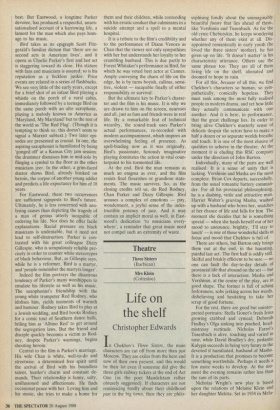Theatre
Mrs Klein (Cottesloe)
Life on the shelf
Christopher Edwards
In Chekhov's Three Sisters, the main characters are cut off from more than just Moscow. They are exiles from the here and now of their own present, and this would be their lot even if someone did give the three girls railway tickets at the end of Act One (as the poet Mandelstam rather obtusely suggested). If characters are not reminiscing fondly about their childhood past in the big town, then they are philo- sophising fondly about the unimaginably beautiful future that lies ahead of them, like Vershinin and Tusenbach. As for the old cynic Chebutykin, he keeps wondering whether any of them exist at all. Dis- appointed romantically in early youth (he loved the three sisters' mother), he has given up on life. 'It doesn't matter' is his characteristic utterance. Others use the same phrase too. They are all of them living life on the shelf, alienated and doomed to hope in vain. For all this, because of all this, we find Chekhov's characters so human, so sym- pathetically, comically hopeless. They must rank among the most fully realised people in modern drama, and yet how little they actually communicate with one another. And it is here, in performance, that the great challenge lies. In order to bring alive Chekhov's masterly sense of delicate despair the actors have to make a half a dozen or so separate worlds breathe and touch. It is one of the most elusive of qualities to achieve in the theatre. At the moment it is eluding this RSC company under the direction of John Barton.
Individually, many of the parts are well realised. It is a sense of unity that is lacking. Vershinin and Masha are the most complete. Brian Cox departs, successfully, from the usual romantic battery comman- der. For all his provincial philosophising, he is a dashing, virile and attractive man. Harriet Walter's grieving Masha, washed up with a husband who bores her, snatches at her chance of life and falls for him. The moment she decides that he is something special — when she hauls herself out of her mood to announce, brightly, 'I'll stay to lunch' — is one of those wonderful shifts in focus and mood that Chekhov is full of.
There are others, but Barton only brings them out at the end, in the haunting, painful last act. The first half is oddly stiff. Skilful and briskly efficient to be sure — no one can fault the day-to-day details of provincial life that abound on the set — but there is a lack of interaction. Masha and Vershinin, at the centre of the play, are in good shape. The former is full of aching forlornness, sobs jerking across her words, disbelieving and hesitating to take her scrap of good fortune.
For the rest, there are good but uninter- preted portraits: Stella Gonet's fresh Irina growing crabbed and cynical; Deborah Findlay's Olga sinking into pinched, head- mistressy rectitude. Nicholas Farrel's Tusenbach is alive, touching and varied 111 tone, while David Bradley's dry, pedantic Kulygin succeeds in being very funny as the devoted if humiliated, husband of Masha. It is a production that promises to become something worthwhile. Perhaps it needs a few more weeks to develop. At the mo- ment the evening remains rather less than the sum of its parts. Nicholas Wright's new play is based upon the relations of Melanie Klein and her daughter Melitta. Set in 1934 in Mela- nie's Hampstead study, the play has three characters — as well as Klein mere et fille, we also meet Paula, a daughter substitute who makes up this trio of German Jewish psychoanalysts on the run from fascism.
The piece, for all its adroit handling of surrogate and displacement figures, can be taken as a study in self-centredness. Mela- nie (Gillian Barge), a Freudian child analyst, is portrayed as a larger-than-life, egocentric mother monster who gobbles up her offspring (psychically speaking). Melit- ta (Francesca Annis) hates but cannot do without her — the very picture, it seems, of Melanie's own theory of the child/mother relation, albeit in its unresolved, immature state. Paula (Zoe Wanamaker) meantime slyly insinuates herself into Melitta's place by playing out (in several senses) the dual role of patient and analyst to Melanie. The playwright and, in particular, Gil- lian Barge make a virtue out of Melanie Klein's own self-dramatising, self- regarding staginess. As a performance this is certainly a consummate piece of over- acting. Nevertheless, I found the play's reliance upon joky sententiousness very resistible. Perhaps no one could be ex- pected to endure the pathological man- ouvrings of three psychoanalysts on stage without some leavening of humour and froth. But for me the humour obstructed what might in the end have become a more intense, and certainly a less cosy, piece of psychodrama.























































 Previous page
Previous page